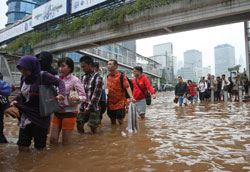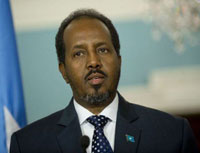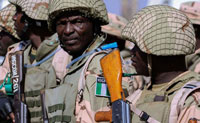News from Indonesia, Somalia and Mali
Tuesday's World Events — Posted on January 22, 2013
INDONESIA – 20,000 people evacuated as floods paralyze capital

People cross a flooded street while holding a cord for safety in Jakarta, Indonesia Friday, Jan. 18, 2013. Indonesia’s army deployed rubber boats in the capital’s business district on Thursday to rescue people trapped in floods that inundated much of the city of 14 million people.
JAKARTA | Indonesia’s army deployed inflatable boats in the capital’s business district on Thursday to rescue people trapped in floods that inundated much of the city of 14 million people.
The president was pictured standing in water up to his shins – his trousers rolled up – at the palace waiting for the arrival of Argentina’s leader on a state visit.
The floods were the most widespread to hit Jakarta in recent memory.
Authorities said at least four people were killed and 20,000 evacuated. Many more homes were inundated following around five hours of heavy overnight rain that coursed through rivers already swollen by a long monsoon season.
Few areas in the city were spared, from wealthy suburbs to riverside slums and gleaming downtown business blocks. Offices and schools were deserted and traffic ground to a halt. The international airport was operating normally, but travelers were finding it hard to get there.
The city has long been prone to floods, but successive governments have done little to mitigate the threat.
Deforestation in the hills to the south of the city, chaotic planning and the garbage that clogs the hundreds of rivers and waterways that crisscross the city are some of the factors contributing to the flooding.
SOMALIA – U.S. Will Recognize Somalia’s Government

Somalian President Hassan Sheikh Mohamud speaks during a press conference with US Secretary of State Hillary Clinton following meetings at the State Department in Washington, DC, on January 17, 2013.
The U.S. will officially recognize Somalia’s government after more than two decades, acknowledging progress there against Islamist extremists, a U.S. official said Wednesday.
The recognition of a Somali government will open the door for greater assistance from U.S. and international aid agencies, said Johnnie Carson, the top U.S. diplomat for Africa.
The plan comes even as a Somali militant group said it had decided to execute a French hostage abducted in the East African country in 2009 – although French officials said they believed the man was killed by his captors during a rescue attempt on Saturday.
France, with U.S. backing, conducted the helicopter raid in a bid to free the French army consultant.
Official recognition took place on Thursday when Secretary of State Hillary Clinton met Somali President Hassan Sheikh Mohamud in Washington.
The U.S. hasn’t recognized a Somali government since warlords toppled dictator Mohamed Siad Barre in 1991. U.S. intervention collapsed two years later after militants shot down two Black Hawk helicopters and killed 18 U.S. forces after a botched raid on a warlord in Mogadishu.
Mr. Carson said the African Union, with U.S. financial support, has made significant progress in recent years stabilizing Somalia and pushing al Qaeda and al-Shabaab out of cities and towns.
MALI – West African forces begin Mali mission
Africa’s ECOWAS soldiers are supporting France in the fight against Islamists in Mali. But doubts have been expressed about their overall fire power and the level of training among the troops.
The military mission of the Economic Community of West African states (ECOWAS) began with the arrival in Bamako of 40 Togolese soldiers.
They were welcomed at the airport by French and Malian officers. The ECOWAS force will ultimately number 3,000 men.
In an interview with DW (Deutsche Welle news), non-commissioned officer Camille Jonas Wassite said he was proud to be part of the mission. “Life is hard for people in northern Mali. The international community must help these people. Our intervention is a necessity,” he said.
In addition to the soldiers from Togo, troops from ECOWAS states Nigeria, Niger, Burkina Faso, Senegal, Benin, Guinea and Ghana will be fighting in Mali. Chad, which is not an ECOWAS member, also plans to participate. The intention is to join forces with the French and Malian armies in order to push back the Islamist rebels from the north of the country. Since January 11, 2012, the French army has fought the Islamists with air attacks and ground troops. This followed rebel advances to the south.
“We are not afraid to confront the Islamists,” Togolese Lieutenant-Colonel Mawoute Bayassim Gnamkoulamba told DW. “We are professionals who have been trained for this. I am certain our intervention in northern Mali will be successful.”
(The news briefs above are from wire reports and staff reports posted at The Washington Times on Jan. 17, The Wall Street Journal on Jan. 16 and Germany’s Deutsche Welle (dw.de) on Jan. 18.)
Questions
1. For each of the 3 countries, give the following information:
a) location/the countries that share its borders
b) the religious breakdown of the population
c) the type of government
d) the chief of state (and head of government if different) [If monarch or dictator, since what date has he/she ruled? - include name of heir apparent for monarch]
e) the population
[Find the answers at the CIA World FactBook website. For each country, answers can be found under the "Geography" "People" and "Government" headings. Go to worldatlas.comfor a list of continents.]
2. For INDONESIA:
a) list the who, what, where and when of the news item
b) Jakarta is prone to flooding. What is the cause?
3. For SOMALIA:
a) list the who, what, where and when of the news item
b) Ask a parent to tell you what he/she knows about Black Hawk Down.
4. For MALI:
a) list the who, what, where and when of the news item
b) Why have doubts been raised about the effectiveness of ECOWAS soldiers in defeating Islamic terrorists in Mali?
Background
INDONESIA:
- Flooding is a perennial problem in this sprawling city, which contributes more than 10% to the gross domestic product of Southeast Asia's largest economy.
- Along with inadequate infrastructure and worsening traffic - a result of rising vehicle purchases by the fast-growing middle class - flooding poses a risk to efforts to attract capital and reduce logistical bottlenecks that interfere with business. The government aims to maintain Indonesia's annual GDP growth at near-record rates of more than 6% in the coming years.
- Jakarta's new governor, Joko Widodo, has promised to tackle traffic and flooding during his tenure. Experts say that would require a substantial redesign of existing infrastructure, as flooding in the city is due largely to construction that leaves little room for runoff, as well as an underdeveloped sewer system and drainage waterways clogged with trash.
- On Thursday Mr. Widodo declared a state of emergency through Jan. 27, after visiting flooded areas and meeting with displaced citizens. He said the provincial government would provide emergency relief to flood victims. (from wsj.com)
SOMALIA:
The U.S. move to re-establish diplomatic relations with Somalia turns the page on the darkest chapter in ties between the two nations, when in 1993 Americans were anguished by scenes of US soldiers being dragged through the streets of Mogadishu by a mob after Somali militants shot down two Black Hawk helicopters. Eighteen Americans died, and 80 were wounded.
Somalia has not had an effective central government since 1991. But a new Somali administration took office last year, ending eight years of transitional rule by a corruption-riddled government.
In recent months, a 17,000-strong African Union force, fighting alongside government troops and Ethiopian soldiers, and backed by US aid, finally wrested a string of key towns from the control of Islamist Shebab insurgents.
"Today, thanks to the extraordinary partnership between the leaders and people of Somalia with international supporters, al-Shebab has been driven from Mogadishu and every other major city in Somalia," Clinton said. "For the first time in two decades, this country has a representative government with a new president, a new parliament, a new prime minister, and a new constitution."
She stressed that there was still a lot of work facing the country's new leaders, "but they have entered into this important mission with a level of commitment that we find admirable."
A university lecturer, Somalian President Hassan Sheikh Mohamud defied predictions to be chosen by lawmakers as Somalia's new president from among a dozen hopefuls in September elections. In a sign of the violence still plaguing his country, however, he survived an assassination attempt just days after his inauguration.
"We are working for a Somalia that is at peace with itself and with its neighbors, where its citizens can go about their daily lives in safety," Mohamud told Clinton. "Instability, violent extremism, and crime in Somalia are threat not only to Somalia, but to the region, and the world at large. We look to the future with hope, pride, and optimism."
The US move opens doors to the country, which will also be the focus of a new international conference to be hosted in Britain in May.
A US official, who asked to remain anonymous, had said no official American aid package was unveiled at Thursday's State Department meeting. However "the fact that we recognize a government there would allow us to do things through USAID we have not been able to do before," he said, and would also pave the way for aid from the World Bank and the IMF. (from an AFP story at yahoonews)
MALI - ECOWAS in MALI:
Marco Wyss, a security expert at the Swiss Federal Institute of Technology in Zurich, says ECOWAS has weaknesses. "Be it equipment, training or troop morale, the ECOWAS states' military capabilities are not sufficient to defeat such an opponent," he said in an interview with DW. That is why previous military interventions by ECOWAS in other conflicts had also not been crowned by success.
In the early 1990s, ECOWAS troops intervened for the first time in Liberia. They were later accused of taking sides in the civil war there. In addition, individual ECOWAS soldiers were alleged to have used excessive force against the civilian population. There were also accusations of rape. Later missions in Sierra Leone, Guinea-Bissau and Ivory Coast were also not without criticism.
"In the Ivory Coast civil war ECOWAS wanted to assume responsibility, but found itself having to rely on France at both the operational and material level," said Wyss. This could happen again in Mali. But, said Wyss, France would probably use ground troops only sparingly and would concentrate more on air attacks and reconnaissance. "The ground offensive would then be carried out by the African troops."
Germany will not participate in the military intervention but has provided two transport planes to help ECOWAS get its soldiers to Mali. (from German news Deutsche Welle)
TERRORISTS IN MALI:
Residents fleeing the town of Diabaly (population 35,000) said that Islamist extremists had taken over their homes and were preventing other people from leaving. They said the militants were melting into the population and moving only in small groups on streets in the mud-walled neighborhoods to avoid being targeted by the French.
"No one approaches them. Everyone is afraid," said Ibrahim Komnotogo, who was out of town when the militants seized Diabaly over the weekend but kept in contact by telephone with other residents.
In apparent retaliation for the French offensive, the same group controlling northern Mali occupied a natural gas complex in neighboring Algeria, taking dozens of people hostage, including Americans. Two foreigners were killed.
A former French colony, Mali once enjoyed a reputation as one of West Africa's most stable democracies with the majority of its 15 million people practicing a moderate form of Islam. That changed in April 2012, when Islamist extremists took over the main cities in the country's north amid disarray following a military coup, and began enforcing their version of strict Shariah law.
Security experts warn that the extremists are carving out their own territory in northern Mali from where they can plot terror attacks in Africa and Europe. Estimates of how many fighters the Islamists have range from less than 1,000 to several thousand. The militants are well-armed and funded and include recruits from other countries.
Despite training from U.S. and other Western advisers, the Mali army has been ineffective in fighting the militants. Last December, the U.N. Security Council passed a cautious resolution, outlining steps that needed to be taken before an international military intervention, one which diplomats said would not occur before at least September.
But last week, French President Francois Hollande authorized airstrikes in Mali to stop a sudden southward push by three Islamist rebel groups, including Hamaha's. The Islamists warned that France had "opened the doors of hell" and that all French nationals would pay, as would any country that helped the military intervention.
France's allies have offered vocal support for the country's military operation in Mali, but when it comes to sending troops or weapons, they are agreeing to the bare minimum: a transport plane here and there, a handful of support staff and a lot of promises to think about it.
American officials say they are providing intelligence to its European ally and are considering deploying American aircraft to land in Mali for airlift or logistical support. The U.S. is offering possible surveillance drones, too, but won't entertain notions of sending American troops to keep terrorists from carving out a safe haven like they did in Afghanistan before the Sept. 11, 2001, attacks.
"We share the same goals as the French and of the states in the region. We support what the French are attempting to do," said Johnnie Carson, the top U.S. diplomat for Africa, speaking Wednesday at the Wilson Center in Washington. (from an Associated Press story at yahoonews)

